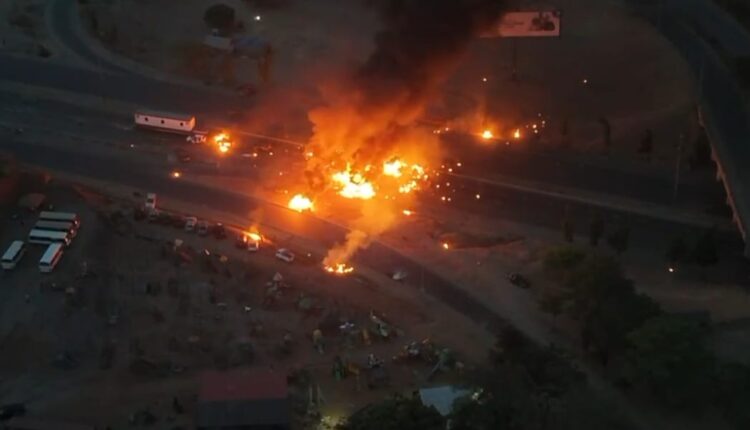CNG Truck Explosion Kills Dozens in Abuja: A Tragic Incident Sparks Nationwide Mourning
ABUJA — A devastating explosion involving a Compressed Natural Gas (CNG) truck claimed dozens of lives and razed several vehicles near the Karu Bridge on the Abuja-Keffi Expressway on Wednesday evening, March 19, 2025. The incident has left the nation in shock, prompting calls for improved safety measures and a thorough investigation into the cause of the tragedy.
Details of the Incident
The explosion occurred at approximately 7:14 p.m. when the driver of a CNG-laden truck lost control while descending Kugbo Hill toward Nyanya. According to eyewitnesses, the truck collided with multiple vehicles trapped in traffic, causing its CNG canisters to dislodge and ignite a massive inferno.
- Casualties: Many victims were burned beyond recognition, with rescue teams still working to determine the exact death toll. Initial reports suggest dozens of fatalities, while six vehicles were completely destroyed.
- Traffic Gridlock: The explosion caused severe vehicular congestion stretching as far as AYA Junction in Asokoro, leaving commuters stranded for hours.
Emergency Response
The Federal Capital Territory Emergency Management Department (FEMD), alongside the Federal Fire Service, FCT Fire Service, Nigeria Police Force, and National Emergency Management Agency (NEMA), swiftly deployed search-and-rescue teams to the scene.
Mark Nyam, Head of Forecasting Response and Mitigation at FEMD, confirmed that efforts to recover victims and extinguish the fire continued late into the night.
“This is one of the most tragic incidents we’ve seen in recent years. Our teams are working tirelessly to ensure no lives are left unaccounted for,” Nyam stated.
Cause of Explosion: Brake Failure Confirmed
The FCT Fire Service revealed that brake failure was responsible for the accident. Ibrahim Mohammad, Public Relations Officer for the fire service, explained that the truck lost control and collided with stationary vehicles, causing its CNG containers to dislodge and ignite upon impact.
“The flying canisters triggered explosions up to 900 meters away from the crash site,” Mohammad said.
Contrary to earlier claims linking the explosion to faulty CNG cylinders, presidential adviser Bayo Onanuga clarified that the cylinders remained intact and were not responsible for the inferno.
Impact on Commuters and Communities
- Displacement: Many commuters resorted to trekking long distances due to road closures and traffic disruptions caused by the explosion.
- Economic Losses: The destruction of vehicles and infrastructure has raised concerns about compensation for affected families and businesses.
Government Reaction
The Federal Government expressed deep condolences to victims’ families and assured Nigerians that a detailed investigation would be conducted. Minister of Transportation Adamu Suleiman emphasized the need for stricter safety regulations for trucks transporting hazardous materials.
Conclusion
The tragic CNG truck explosion in Abuja underscores urgent gaps in road safety standards and emergency preparedness. As authorities work to uncover more details about this catastrophe, Nigerians are calling for immediate reforms to prevent similar incidents in the future.

















